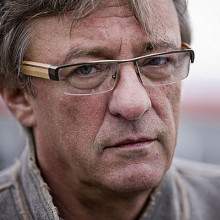Polish literature

Janusz Rudnicki
Born 1956, Janusz Rudnicki is a prose writer and columnist. As a Solidarity activist he was interned, and later imprisoned. In 1983 he emigrated to Germany and settled for many years in Hamburg, where he gained a degree in Slavonic studies and German studies.
In 1988 he started contributing to the monthly periodical Twórczość, which published a number of short stories from his first book You Can Live (Można żyć). The early works that make up this volume are traditional, realist stories referencing the author’s personal experiences from his first years as an émigré. One of the fruits of Rudnicki’s close cooperation with Twórczość was ‘Letters from Hamburg’, a kind of personal column in which, every few months, he would showcase new texts, employing an unusual genre formula akin to the contemporary ‘silva’ (autobiographical musings with elements of the column form, blended with literary fiction). In the years 1991–1997 a total of twenty-two ‘Letters from Hamburg’ were published, and the collected ‘Letters…’ were also released in book form as The Bloody World (Cholerny świat, 1994) and Over the Rainbow and Back Again (Tam i z powrotem po tęczy, 1997). This period of his creative activity was summed up in Potato Stretch (Męka kartoflana, 2000), a collection of his most pertinent ‘Letters…’ supplemented with new texts; in them, Rudnicki consistently portrays himself as an untypical émigré, constantly shuttling back and forth – after 1990 – between Germany and Poland, and as a collector of ‘effects of foreignness’ and all manner of confrontations between different mentalities and cultures. He takes a mocking, and on occasion even derisive stance with respect to national stereotypes and complexes. Although for the most part he focuses on the immediate sphere of reality accessible to him, he broaches a variety of discursive spaces, including literary criticism (in essays on Kafka, Bruno Schulz, or the diaries of Zofia Nałkowska and Maria Dąbrowska) and film criticism; he also frequently comments on current political disputes and social conflicts, from the position of a ‘foreign’ observer and commentator of Polish affairs.
His later volumes of prose also comprise a diverse range of themes and forms. The general principle remains the same: literary invention segues into autobiographical authenticity (or vice versa); comments and impressions are interspersed with citations and paraphrases. With My Wehrmacht (Mój Wehrmacht, 2004), one of the most interesting conceptions of Rudnicki’s writing begins to emerge: the creation of his own, fully original stories based on selected texts. This collection opens with two extended essays on two monographs: Brechts Frauen (Brecht’s Women, Kobiety Brechta) and Die Frauen der Nazis (The Nazis’ Women, Kobiety nazistów). Rudnicki’s interpretation of both of these books is highly subversive – though the word ‘interpretation’ does not convey the essence of his treatment of them. What he in fact does would be better described as ‘superimposing’ his own text on the original. In time he has increasingly come to select biographical works as his choice of original text. He has even invented a separate category of writing for what he does: the ‘life writer’ (‘życiorysta’). This is someone who is a derivative biographer, someone who peruses biographical (and sometimes autobiographical) works by others, studies their content diligently, and subsequently ‘superimposes’ their own narrative onto it. The potential inherent in this perhaps parasitic but nonetheless exceedingly productive method is revealed in the collection The Life Writer (Życiorysta, 2014).
The constant circulation of the same motifs and threads is clearly discernible in Rudnicki’s writing. This aspect of his work is perhaps most readily apparent in his novel Come on, Let’s Go (Chodźcie, idziemy, 2007), in which he again addresses the state of long-term émigrés who are stretched between two cultures – or rather two systems of values. A recurrent character in his prose is an alter-ego figure called ‘Herr Rudniki’, who engages in a schizophrenic dialogue with the real Rudnicki. In the short stories and jottings in Death of a Czech Dog (Śmierć czeskiego psa, 2009) the circles of foreignness widen – alongside Poles we are also introduced to other groups including Czechs and Gypsies with German passports, and the autobiographical protagonist stops off – always briefly – in various parts of Europe (for example, Prague and Luxembourg). Gradually, then, the theme of migration, of a type of wandering, gains in importance, accompanied by praise of rootlessness/non-assimilation. Rudnicki is keen to present himself as an incorrigible vagabond and collector of impressions, who can ‘make literature’ out of every observation or micro-incident.
BIBLIOGRAPHY
- Można żyć, Wrocław: Wydawnictwo Dolnośląskie, 1992.
- Cholerny świat, Wrocław: Wydawnictwo Dolnośląskie, 1994.
- Tam i z powrotem po tęczy, Warszawa: PIW, 1997.
- Męka kartoflana, Wrocław: Wydawnictwo Dolnośląskie, 2000.
- Mój Wehrmacht, Warszawa: W.A.B., 2004.
- Chodźcie, idziemy, Warszawa: W.A.B., 2007
- Śmierć czeskiego psa, Warszawa: W.A.B., 2009
- Trzy razy tak!, Warszawa: W.A.B., 2013
- Życiorysta, Warszawa: W.A.B., 2014
TRANSLATIONS
Czech:
- Smrt ceskeho psa, trans. Vera Vytrisalova, Jan Faber, Ostrava: Protimluv, 2008
German:
- Meine Abenteuer mit Menschen oder wie ich als Statist und Rezensent tätig war [Moje przygody z ludźmi, czyli jak statystowałem i recenzowałem], Göttingen: Steidl Verlag, 1995.
- Ich, der Friseur und die anderen [Ja, łebski fryzjer i inni], Hannover: Postskriptum Verlag, 1996.
- Rückkehr [Powrót]. In: Landschaften und Luftinseln. München: dtv 2000.
- Die verrückten Reisen eines Grenzgängers. Herne: Tibor Schäfer Verlag 2000.
- Der Grenzgänger, trans. Ursula Kiermeier, Doris Daume, Henryk Bereska, Herne: Tibor Schäfer, 2002
- Karfoffelqual [Męka kartoflana], Muenster [Am Erker], 2004.